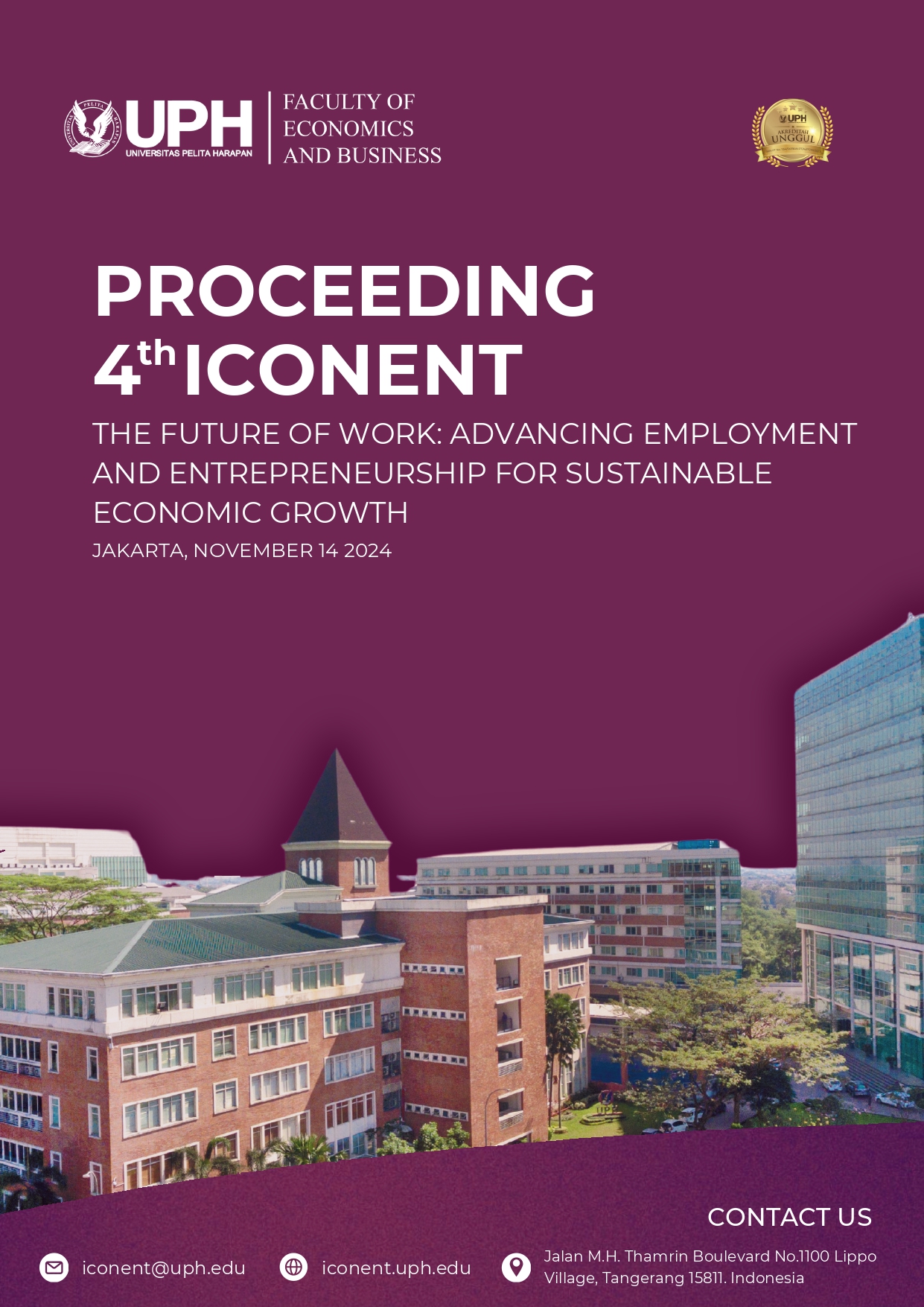The Influence of the United Nations Guiding Principles on Business and Human Rights (UNGP) on Multinational Corporations (MNC) Employment Practices in Emerging Markets: Case Study of Indonesia
Kata Kunci:
Employment, Labor Rights, Multinational Corporations, United Nations Guiding Principles on Business and Human RightsAbstrak
Multinational Corporations (MNCs) have been crucial to global economic growth since the rise of globalization, contributing to one-third of the global economy, two-thirds of international trade, and employing over 40 million workers worldwide. Some MNCs are wealthier than many sovereign states, reflecting their immense influence. However, this power is often unchecked by global regulations, with MNCs operating under local laws, which in developing countries can be weak or poorly enforced. This regulatory gap allows for the exploitation of resources, labor, and the environment. In Indonesia, MNCs such as Freeport-McMoRan, Unilever, and Phillip Morris International have been linked to labor rights abuses, including unsafe working conditions and low wages. To address these issues, the United Nations introduced the UN Guiding Principles on Business and Human Rights (UNGP) in 2011, built on three pillars: protect, respect, and remedy. Although non-binding, the UNGP has become a global standard for ethical business practices. This study examines how MNCs in Indonesia adapt their policies to align with international human rights standards, with emphasis in its employment practices, using a descriptive-qualitative method based on literature studies. The findings reveal that MNC compliance with the UNGP varies depending on the industry, local governance, and corporate governance. Challenges such as weak regulatory enforcement and socio-economic disparities hinder the full application of the UNGP in Indonesia. The study emphasizes the need for stronger government oversight and corporate accountability to ensure fair and sustainable employment practices in emerging markets like Indonesia.
Referensi
Amnesty International. (2020). Palm Oil Plantations and Labor Rights in Indonesia: Uncovering Abuse in the Supply Chain. Amnesty International Reports.
Anggraeni, A, Dharmiasih, D. A. W., & Resem, P. T. K. (2015). Peran Oxfam dalam Kasus Penindasan Buruh Nike di Indonesia Pada Tahun 2002-2012. Diskusi Ilmiah Komunitas Hubungan Internasional, 1(3). https://ojs.unud.ac.id/index.php/hi/article/view/12729.
Anita. (2024). Legal Studies of Law Number 13 of 2002 Concerning Labor in Terms of Minimum Wage. Journal of Police and Law Enforcement, 1(2), 70-82. https://doi.org/10.55499/derecht.v2i1.175.
Aryani, N. M., Dayanthi, A. P. L., & Hermanto, B. (2022). Quo Vadis Protection of The Basic Rights of Indonesian Workers: Highlighting the Omnibus Legislation and Job Creation Law. Pandecta, 17(1), 103-120. http://dx.doi.org/10.15294/pandecta.v17i1.34948.
Badan Pusat Statistik. (2024). Proportion of Informal Employment in Total Employment by Education Level, 2021-2023. BPS Statistics Indonesia. https://www.bps.go.id/en/statistics-table/2/MjE1NyMy/proportion-of-informal-employment-in-total-employment-by-education-level.html.
BBC Indonesia. (2024). Mengenal Lebih Dekat Struktur Kabinet Merah Putih 2024: Keunikan dan Efisiensi Pemerintahan Indonesia. BBC Indonesia. https://www.bbc.com/indonesia/articles/cr4xgkz2l3ro.
Bloomberg. (2023). Opportunity Indonesia: Opening Doors to Foreign Investment. Bloomberg.
Chandler Jr., A. D., and Mazlish, B. (2005). Leviathans: Multinational Corporations and the New Global History. Cambridge University Press.
Cohn, T. (2020). Global Political Economy (8th ed.). Longman.
Cropley, A. (2023). Qualitative Research Methods: A Practice-Oriented Introduction. https://www.researchgate.net/publication/285471178_Introduction_to_Qualitative_Research_Methods.
East Asia Forum. (2024). Prabowo’s Pursuit of 8 Percent Growth: Challenges Ahead. East Asia Forum. https://eastasiaforum.org/2024/10/22/prabowos-pursuit-of-8-per-cent-growth%20wont-be-without-problems/.
Foley, C. F., Hines, J., & Wessel, D. (2021). Global Goliaths: Multinational Corporations in the 21st Century Economy. Brookings Institution Press.
Good News from Indonesia. (2024). Kabinet Merah Putih 2024: Menambah kepercayaan publik pada isu hak asasi manusia. Good News from Indonesia. https://www.goodnewsfromindonesia.id/2024/11/04/mengenal-lebih-dekat-struktur-kabinet-merah-putih-2024-keunikan-dan-efisiensi-pemerintahan-indonesia.
Indonesian National Human Rights Commission. (2023). Indonesia’s National Action Plan for Human Rights (2023-2025). https://globalnaps.org/wp-content/uploads/2024/02/NAP-Indonesia-2023-open-Indonesian.pdf
International Coalition for Papua. (2020). PT Freeport Indonesia and Its Tail of Violationa in Papua: Human, Labour, and Environmental Rights. https://www.tapol.org/sites/default/files/PT_Freeport_Indo_tail_of_violations_in_Papua_Dec20.pdf.
International NGO Forum on Indonesian Development. (February 17, 2022). Berantas Tuntas Pelanggaran HAM di Sektor Bisnis. INFID. https://infid.org/berantas-tuntas-pelanggaran-ham-di-sektor-bisnis/.
Izzati, N. R. (April 19, 2022). Deregulation in Job Creation Law: The Future of Indonesian Labor Law. Padjajaran Journal of Law, 9(2), 191-209. https://doi.org/10.22304/pjih.v9n2.a3.
Kartadjoemena. H. S. (1973). Indonesia and the Multinational Corporations on Public Policy Issues for the Future. EKI 21(3), 181-199. https://www.lpem.org/repec/lpe/efijnl/197311.pdf.
Kompas TV. (2024). Menko Hukum Prabowo Sebut Tragedi 1998 Bukan Pelanggaran HAM Berat, Beda dari Pemerintah Sebelumnya. Kompas TV. https://www.kompas.tv/nasional/547486/menko-hukum-prabowo-sebut-tragedi-1998-bukan-pelanggaran-ham-berat-beda-dari-pemerintah-sebelumnya.
Muchlinski, P. (2021). The Impact of the UN Guiding Principles on Business Attitudes to Observing Human Rights. Business and Human Rights Journal, 6(2), 212-226. https://doi.org/10.1017/bhj.2021.14.
Neuman, W. L. (2007) Basics of Social Research: Qualitative and Quantitative Approaches. Pearson.
Neuman, W. L. (2014) Social Research Methods: Qualitative and Quantitative Approaches (7th ed.). Pearson.
Ruggie, J. G. (2013). Just Business: Multinational Corporations and Human Rights. W.W. Norton & Company.
Sadi, M., and Sobandi. (2020). Hukum Ketenagakerjaan di Indonesia. Kencana.
Safitri, S. C., and Santoso, I. B. (2022). The Legal Protection For Labours According To Indonesian Laws. Law Research Review Quarterly, 8(1), 105-122. https://doi.org/10.15294/lrrq.v8i1.53759.
Sampurna, R. H. (2019). A Critical Review of the Impact of Multinational Corporations (MNCs) on Indonesian Economy. Jurnal Ilmu Sosial dan Politik, 9(1), 221-233. https://doi.org/10.15575/jispo.v9i1.4359.
Sudiarawan, K. A., Dharmawan, N. K. S., Karunian, A. Y., Dananjaya, A. Y., Dananjaya, I. K., & Lokahita, K. I., (2024). The Indonesian Outsourcing Workers’ Right in the Tourism Business Sector: Toward Better Protection?. Lentera Hukum, 10(3), 365-390. https://doi.org/10.19184/ejlh.v10i3.43325.
U.S. Department of Commerce. (2020). Activities of U.S. Multinational Enterprises, 2019. Bureau of Economic Analysis U.S. Department of Commerce. https://www.bea.gov/news/2021/activities-us-multinational-enterprises-2019.
Wolfsteller, R., & Li, Y. (2022). Business and Human Rights Regulation After the UN Guiding Principles: Accountability, Governance, Effectiveness. Human Rights Review, 23(1), 1-17. DOI: 10.1007/s12142-022-00656-2.
Zainullah, M. (2023). The Compatibility of Indonesia’s Job Creation Law Number 11 of 2020 with United Nations Guiding Principles on Business and Human Rights. Jurisdictie: Jurnal Hukum dan Syariah, 14(1), 1-36. https://doi.org/10.18860/j.v14i1.21301.
Unduhan
Diterbitkan
Terbitan
Bagian
Lisensi

Artikel ini berlisensiCreative Commons Attribution-NonCommercial-ShareAlike 4.0 International License.

 Fakultas Ekonomi dan Bisnis | Universitas Pelita Harapan | Kampus Universitas Pelita Harapan | Gedung F Lt. 12 | Lippo Karawaci, Tangerang - 15811 | Telp 021-5460901 | Fax 54210992
Fakultas Ekonomi dan Bisnis | Universitas Pelita Harapan | Kampus Universitas Pelita Harapan | Gedung F Lt. 12 | Lippo Karawaci, Tangerang - 15811 | Telp 021-5460901 | Fax 54210992